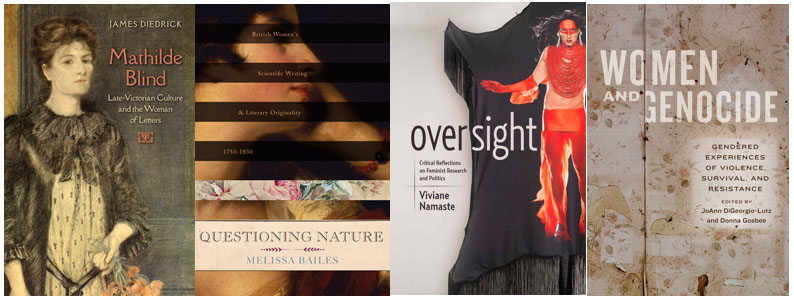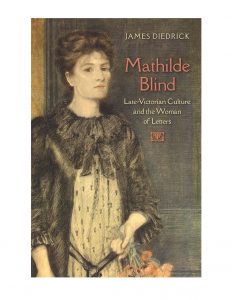I’m pleased to note that my biography Mathilde Blind: Late-Victorian Culture and the Woman of Letters was given pride of place on the 8 March 2017 Eurospanners International Women’s Day blog post highlighting recent books that “remind us of women who were bold for change and of the women that need us, in turn to be bold.” The introduction to this list of notable books reads:
Today is International Women’s Day. It, alongside the whole of Women’s History Month is a time for celebration and reflection, to honour the women whose endeavours have brought us closer to gender parity, and to consider how we can take the movement for women’s liberation forward.
This year’s IWD theme is Be Bold for Change. These titles remind us of women who were bold for change and of the women that need us, in turn to be bold. They bring fresh insights into women’s contributions to science and society, positioning them as invaluable radical thinkers and fearless pioneers. They also consider violence against women and the portrayal of Pakistani women in the media.
Here are the descriptions of the four books (two are published by the University of Virginia Press):
NEW
Mathilde Blind
Late-Victorian Culture and the Women of Letters
James Diedrick
Feb 2017 336pp, 18 black & white illustrations
9780813939315 Hardback
Victorian Literature and Culture Series
Offers a groundbreaking critical biography of the German-born British poet Mathilde Blind (1841-1896) – a freethinking radical feminist. As the first full-length biography of this trailblazing woman of letters, Mathilde Blind underscores the importance of her poetry and her critical writings.
University of Virginia Press
FORTHCOMING
Questioning Nature
British Women’s Scientific Writing and Literary Originality, 1750-1830
Melissa Bailes
Jun 2017 256pp, 10 black & white illustrations
9780813939766 Hardback
In the mid-eighteenth century, many British authors and literary critics anxiously claimed that poetry was in crisis. Questioning Nature explores how major women writers – including Mary Shelley, Anna Barbauld, and Charlotte Smith – responded by turning to the era’s rising fascination with new discoveries in developing disciplines of natural history such as botany, zoology, and geology.
University of Virginia Press
Women and Genocide
Gendered Experiences of Violence, Survival, and Resistance
Edited by JoAnn DiGeorgio-Lutz & Donna Gosbee
Apr 2016 320pp
9780889615823 Paperback
Illuminating the unique experiences of women both during and after genocide, JoAnn DiGeorgio-Lutz and Donna Gosbee’s edited collection is a vital addition to genocide scholarship. The contributors revisit genocides of the twentieth and twenty-first centuries, from Armenia in 1915 to Gujarat in 2002, examining the roles of women as victims, witnesses, survivors, and rescuers.
Canadian Scholars’ Press
Oversight
Critical Reflections on Feminist Research and Politics
Viviane Namaste
2015 170pp
9780889615731 Paperback
What ideas are overlooked in contemporary feminist politics? How do particular issues become part of the feminist agenda? Why do we need to think about how feminists actualise their political objectives? This book explores these questions through the notion of oversight – a concept used both to consider what has been overlooked and to examine how particular objects of feminist politics become visible.
Canadian Scholars’ Press

